Last updated on August 3rd, 2023

This guide will help you understand how cloud-based CRM systems work and why many businesses adopt them in this day and age.
In 2008, only 12% of the businesses preferred a cloud-based CRM system. But by 2014, that percentage leaped to 87%.
It’s no secret that cloud-based CRMs are growing in popularity, especially among small and medium-sized businesses.
With the right CRM and tools to go with it, your customer relationship-building efforts will come easier.
Today we’ll discuss what cloud-based CRMs are, how they work, and the best one for small business success.
Table of contents:
- What Is a Cloud-Based CRM, And How Does It Work?
- What Are The Benefits Of A Cloud-Based CRM?
- What Are Cloud-Based CRM Features And Use-cases?
- Marketing Features
- Sales Features
- Customer Management Features
- Which Cloud-Based CRM Solution Is Best For Small Business?

VipeCloud is the only Automation tool your small business needs to
be the hero to your customers.
With Email, Texting, Social, Suites, Chat, Stories, Video Email & Sign Up Forms fully built-in, we provide you with the perfect platform to grow your business.
15 Day Free Trial – Get started risk free. No CC needed.
What Is a Cloud-Based CRM, And How Does It Work?
Cloud-Based CRM is a form of customer relationship management software that stores business information on the cloud.
To clarify, it means your information is housed on your CRM provider’s servers and allows you to access your CRM using the internet.
Historically, businesses would store CRM data in-house, making maintaining CRM costly. (Due to software maintenance and hiring IT professionals). As a result, CRM was mainly a commodity for larger companies or those with excess capital.
This led to high-potential smaller businesses missing out on robust customer relationship-building tools.
But times have changed, and today, your small business can outsource data hosting and get the benefits of CRM at a fraction of the cost compared to the past.
This leads us to 3 benefits you can gain from adopting a cloud-based CRM.
What Are The Benefits Of A Cloud-Based CRM?
1. Saves On Operational Costs And Is More Affordable
Cloud-Based CRMs are run by the CRM provider who is responsible for maintaining their effectiveness and efficiency.
By using the cloud, you’re outsourcing the bug fixing, servers, technical support, and updates to vendor professionals who know the ins and outs.
This helps you cut costs on hiring in-house professionals and the other costs of having employees.
Instead, you can focus on department improvements and better business results thanks to fewer operational demands.

Along with the cut costs comes more affordability (and a clearer ROI).
For example, VipeCloud offers many tools for your marketing, sales, and customer service for as little as $20 per month per user.
2. Access Flexibility
Flexibility is a vital asset, especially with so many job roles shifting to being remote.
Cloud-based CRM software lets your seat members access the suite from anywhere with internet and on most devices.
More CRM accessibility gives you the ability to hire team members worldwide who can use your CRM to complete tasks and workflows.
VipeCloud, for example, brings this exact capability thanks to being a cloud-based solution and having a mobile app that can help you:
- Make phone calls
- Send mass email and text messages to contacts
- Create and edit opportunities on your pipeline
- Track campaign engagement
- Create and edit tasks
- Access your CRM on the go
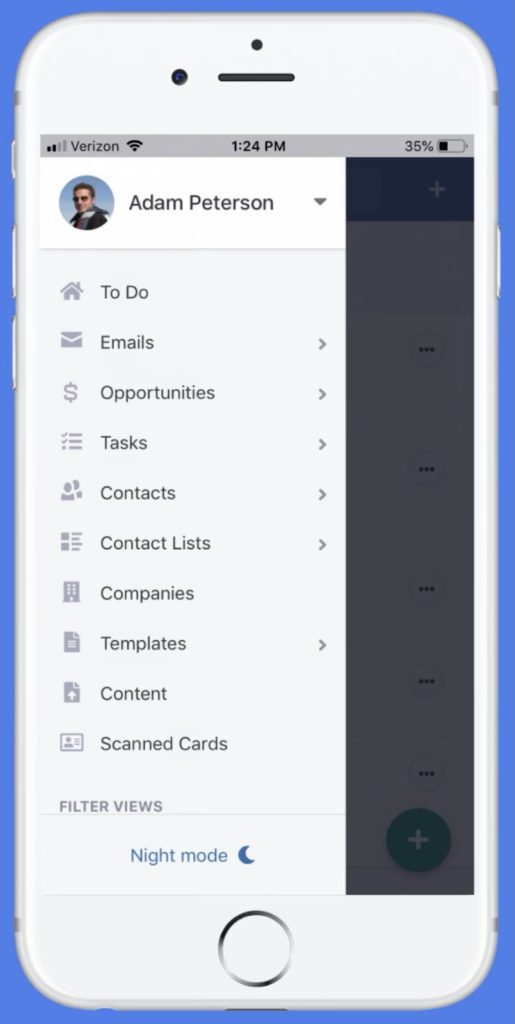
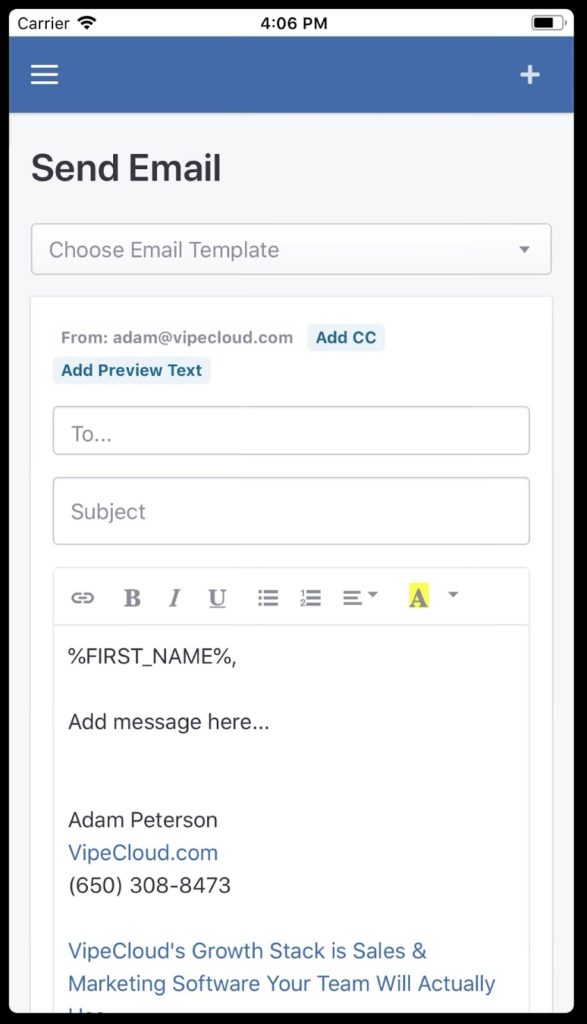
3. Cloud-Based CRM Security
Cloud CRM comes with security measures and practices to protect your valuable data.
One of the well-known ways it does this is with encryption (whether your data is being transmitted or not).
CRM providers also back up customer data on separate servers to ensure information is never lost.
These servers are also protected with around-the-clock security guards and the server facilities are built to withstand adverse weather conditions.
What Are Cloud-Based CRM Features And Use-Cases?
VipeCloud’s Sales & Marketing Suite offers a broad range of tools to give your business lasting leverage.
The information below details what capabilities you can expect with a cloud-based CRM like VipeCloud.
Marketing Features
Email Marketing Campaigns
Email marketing in CRM lets you send emails at scale to your audience and segment who gets what.
Email can be a valuable lead generation and a nurturing tool for cold outreach and re-engagement.
VipeCloud’s email tool lets you use custom fields in your campaigns to personalize your messaging and track metrics to pinpoint how they’re performing.
Additionally, you can expand your email capabilities with email videos and email stories.
Email video lets you send engaging videos that your recipients can view.
And with email stories, your recipients can view short images or videos that look similar to social media stories.
Text Message Campaigns
Text message marketing helps you market to contacts directly on their phones, which is proven to have higher open rates than email.
The average open rate for a text campaign is about 98%, while email open rates are typically 20-30%.
Today, businesses with effective marketing tend to use multiple platforms to engage their audience.
Cloud CRMs make this easy, by having scheduling and automation capabilities.

You can use text campaigns to:
- Send meeting links
- Send reminders
- Offer temporary discounts
- Re-engage prospects and customers
- Gain feedback and ask for a review
- Send company updates to employees and contractors
- Use trigger words to launch a workflow (ex., Typing “YES” to join an email newsletter)
You can also fuse text message marketing with email to have dynamic drip campaigns.
Social Sharing
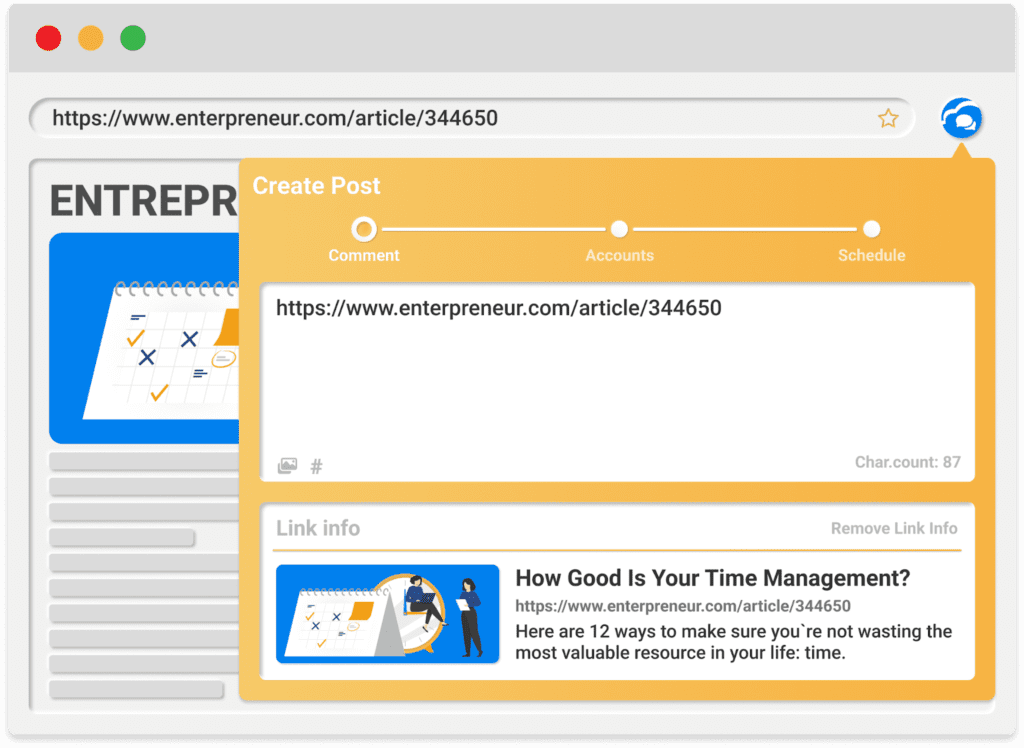
Social media is one of the best marketing channels because your ideal customers are likely on it.
Most in-house CRMs lack a social media component, and those that don’t typically lack modern features.
VipeCloud’s social sharing tool lets you schedule and posts social media content across multiple platforms, including:
If you’re a business that manages many social accounts, you can manage which posts go to which accounts to keep your content organized. (This can be useful for social media marketers or agencies.)
Sales Features
Reports
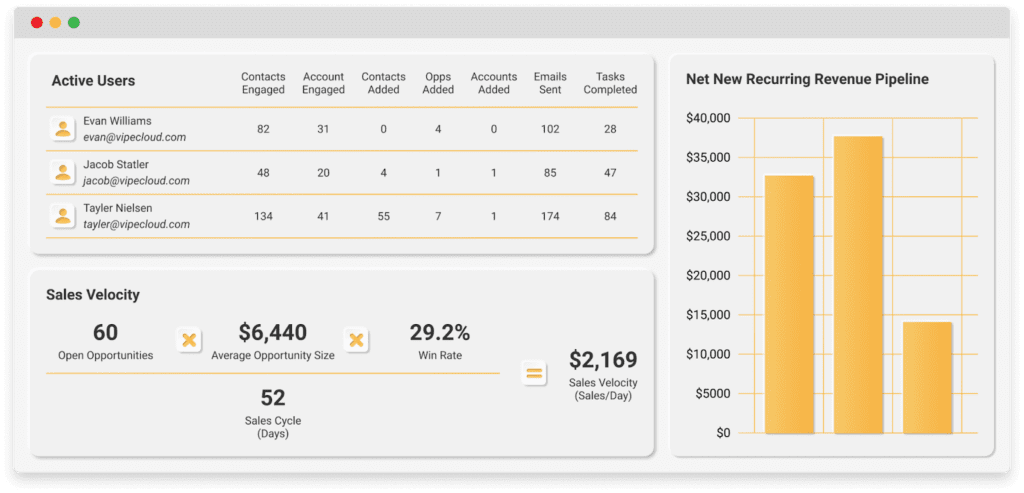
Cloud CRMs like VipeCloud offer reporting functionality that lets you see your operations at a glance.
The insights you take away can help make adjustments more effortless.
A CRM reporting dashboard can track the following:
- Team activity
- Marketing effectiveness
- Sales effectiveness
- Opportunities
Here are some specific metrics a reporting dashboard would track:
- Active users – The number of people in your departments and their activity
- Tasks by type – Tracks how many tasks are completed and how many are open by team member
- Opportunities by stage – Displays how many potential deals you have at each pipeline stage along with dollar value.
- Item counts – Tracks each user’s number of contacts, accounts, opportunities, and tasks.
- Email activity – Tracks email metrics across users.
- Clicks by link – Tallies the number of link clicks each user generates.
- Recurring revenue – Helps forecast monthly products or service revenue.
Contact scoring
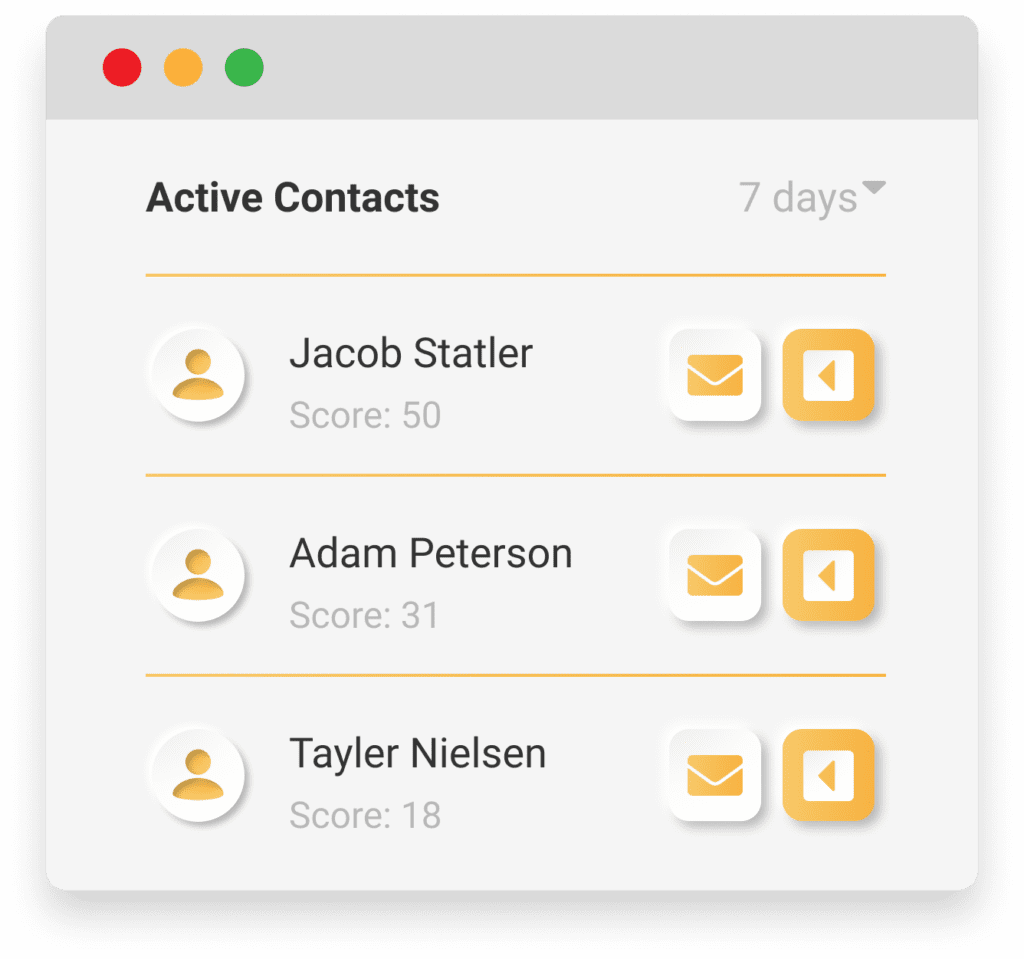
Contact scoring helps you rank your prospects based on how likely they are to convert.
This ranking happens by assigning prospects points based on how well they match your ideal buyer and how much buyer intent they show.
For instance, a CEO (key decision-maker) that clicks your emails and has booked a call with you would score higher than a middle manager that hasn’t engaged with your brand in over 6 months.
Contact scoring gives you freedom on how you want to score contacts with the ability to deduct points for low-buyer intent actions.
By knowing your ideal prospects, you can spend more time nurturing them and finding people similar to them.
This helps whether you’re organically reaching out to clients on LinkedIn or running ads using look-alike audiences for Facebook ads.
Sales Pipeline
Cloud-based CRMs continue with the well-known sales pipeline feature. VipeCloud gives you the ability to edit your pipeline, such as:
- The name of your pipeline stages
- What deal details are shown on your card layouts (primary contacts, the value of the deal, last contact date, etc.)
- Choosing between card or table view preferences.
Sales pipelines keep your deals transparent and can be a good aid when forecasting revenue for the month and prioritizing larger deals.
Customer Management Features
Customer Management and Service Pipelines
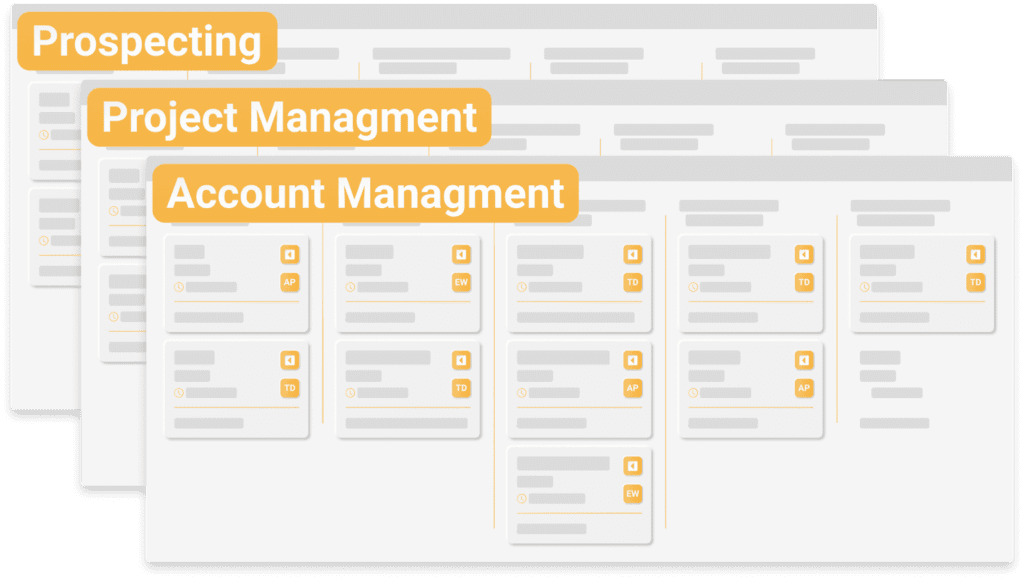
Pipelines have more functionality than just sales — they can extend to account management and customer service.
You can create pipeline stages based on customer service inquiries and move customers through the stages based on what needs were completed.
For instance, you can have new inquiries, open tickets, and closed tickets stages.
From an account management standpoint, you can create a pipeline to reflect the workflow of onboarding a customer and delivering on the service.
Forms
Forms have marketing use-cases, but they’re also reliable for service feedback.
You can use forms to:
- Encourage customers to contact you with questions
- Get service feedback
- Update customer information
Having online forms for your clients and prospects to complete helps them communicate their needs better to your business.
VipeCloud’s form builder comes with simple-to-use standard and customizable fields.
You can also customize your form with images, videos, and different backgrounds to keep your form consistent with your brand website or other landing pages.
Forms are trackable too, so you can see how people are engaging with them through analytics.
Contact Management

The contact database in a cloud CRM stores information about team members, prospects, customers, vendors, employees, stakeholders and more.
Contact details help you create campaigns that reach any contact segment through a different medium.
For example, you can create a “customer” tag for customers and create email video campaigns around your product to send to them.
And you can create an “employee” tag and send text message reminders about company updates to employees.
Which Cloud-Based CRM Solution Is Best For Small Business?
The #1 cloud-based CRM solution for small businesses is VipeCloud.
VipeCloud delivers an easy-to-use interface for business owners who are new to or seasoned with cloud-based CRMs.
Inside, you’ll be able to collaborate with team members on different campaigns and track your business results at a fraction of the price of traditional in-house CRMs.
Cloud-based CRMs also change how you hire team members since you can bring hires from around the world thanks to its flexibility.
If you’d like to see how VipeCloud works, request a demo, and one of our experts will walk you through it.
Want to try VipeCloud for your small business? Sign up for a 15-day free trial!

Leave a Reply